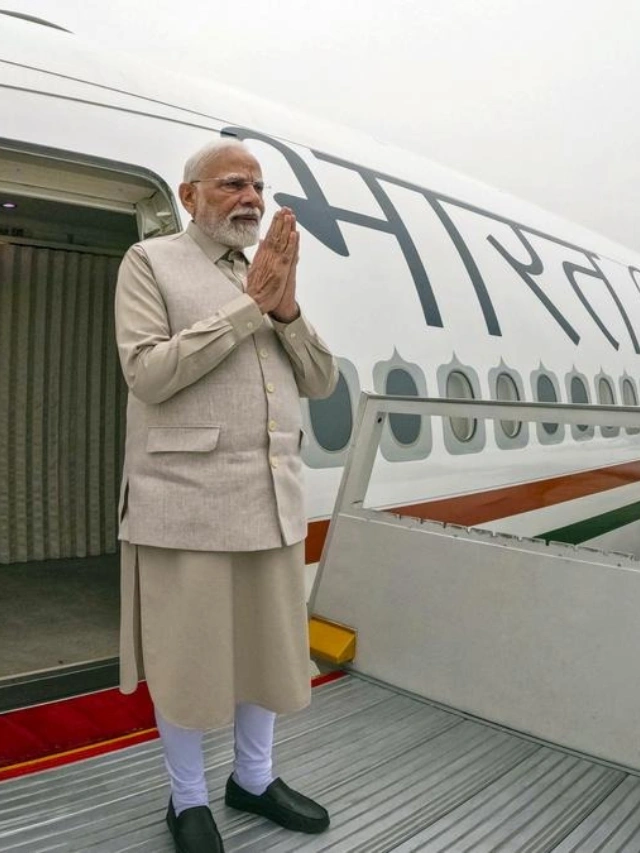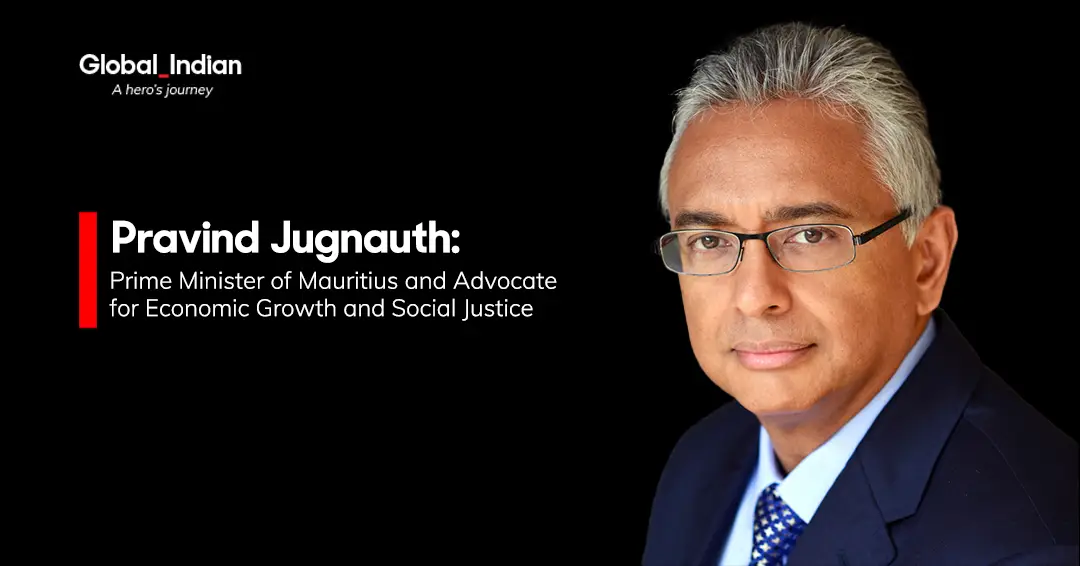
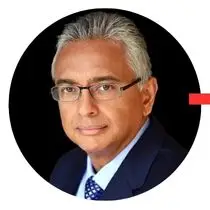
Pravind Jugnauth
Pravind Kumar Jugnauth ended his seven-year run as Prime Minister of Mauritius in November 2024, which brought a major change to the nation’s political scene. His leadership from January 2017 to November 2024 saw a historic diplomatic win against the UK in the Chagos Islands sovereignty dispute.
CEO’s | Actors | Politicians | Sports Stars
The 2024 parliamentary elections brought unexpected results. An impressive 80% of voters turned out, and Jugnauth conceded defeat. His political career started in 1987, and he went on to serve in various ministerial roles including Finance Minister and Minister of Technology. His contributions helped Mauritius achieve a remarkable GDP per capita of over $10,000 in 2022. This piece traces his evolution from a lawyer to one of Mauritius’s most powerful political figures.
“Our vision is to build a stronger, more resilient Mauritius, where every citizen has the opportunity to thrive in a fair and just society.“
Early Life and Family Background of Pravind Kumar Jugnauth
Pravind Kumar Jugnauth was born December 25, 1961, in La Caverne, a suburb of Vacoas-Phoenix, Mauritius. He came from a Hindu Ahir (Yadav) family, setting the stage for his future role in Mauritian politics and governance.
Born into a political dynasty
The Jugnauth name holds substantial political influence in Mauritius. Pravind’s father, Sir Anerood Jugnauth, served as Prime Minister for more than 18 years over three different terms. All but one of the prime ministers in independent Mauritius have come from two families: the Ramgoolams or the Jugnauths.
The Ramgoolams traditionally led the Mauritius Labor Party, while the Jugnauth family created and led the Militant Socialist Movement. This concentration of power among a few families sparked debates about dynastic politics, especially when Pravind became premier in January 2017 after his father stepped down.
The father-to-son transition, though legally allowed, showcased the dynastic nature of Mauritian politics. Members of just three families have led the Indian Ocean archipelago since its independence from Britain in 1968.
Education and formative years
Pravind started his education at Aryan Vedic primary school. He then went to the prestigious Royal College Curepipe for secondary education. His mother Sarojini Ballah, a schoolteacher, helped shape his passion for learning.
After high school, Pravind got his law degree from the University of Buckingham in the United Kingdom in 1985. He became a barrister at Lincoln’s Inn. His legal education expanded with a diploma in civil law from Aix-Marseille University in France.
His time studying abroad exposed him to different cultures and legal systems, which proved valuable in his political career. Pravind married Kobita Ramdanee in 1992, and they have three daughters: Sonika, Sonali, and Sara.
Religious and cultural influences
The Jugnauth family’s Hindu heritage shaped Pravind’s core values and worldview. Growing up in Mauritius’s multicultural society, with its blend of Indian, African, European, and Chinese influences, he learned to value cultural diversity early in life.
This cultural appreciation became clear in his role as Prime Minister. At an event hosted by the Mauritius Tamil Cultural Center Trust to honor elderly Tamil community members, he emphasized Mauritius’s rich cultural and religious heritage.
He wants to promote the country’s ethnic languages, cultures, values, and traditions. His goal is to keep the social fabric strong through peace, brotherhood, and respect. This steadfast dedication shows how his early exposure to different cultures shapes his leadership approach.
Pravind grew up with his elder sister, Shalini Jugnauth-Malhotra, in a close family that supported his personal and professional journey. His childhood in a politically active household prepared him for the challenges of Mauritian politics.
From India to the World
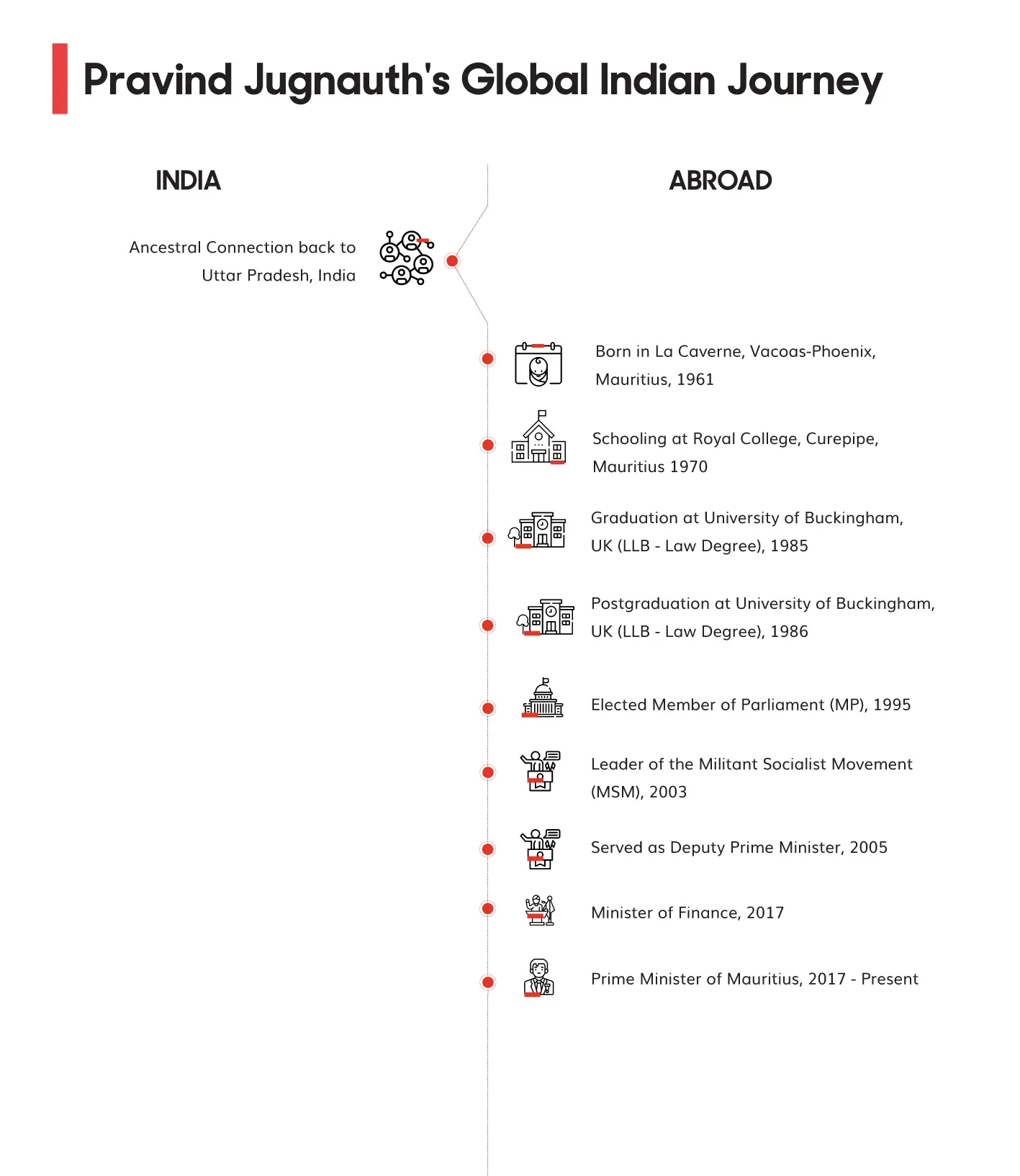
Educational Journey and Legal Career
After completing his secondary education at the prestigious Royal College Curepipe, Pravind Kumar Jugnauth started an educational experience that ended up shaping his professional path. His quest for legal knowledge took him to different continents and built a foundation that served him well in both law and politics.
Law studies at the University of Buckingham
Young Jugnauth chose the University of Buckingham in the United Kingdom to continue his education. This decision became pivotal to his professional growth. He earned his Bachelor of Laws degree (LLB with Honors) from this esteemed institution in 1985. Buckingham University’s rigorous legal program gave him thorough training in common law principles and legal reasoning.
His academic excellence and achievements caught his alma mater’s attention. The University of Buckingham awarded him an Honorary Doctorate in 2005. This honor showed his lasting connection with the institution and his rising prominence in the international community.
Training at Lincoln’s Inn
Jugnauth advanced his legal education at the prestigious Lincoln’s Inn in London after getting his LLB. This historic institution, one of London’s four Inns of Court, has trained barristers since the 14th century. He learned valuable courtroom skills at Lincoln’s Inn and became a barrister-at-law. His understanding of legal advocacy grew deeper during this time.
His father’s path mirrored his own – Sir Anerood Jugnauth had also trained as a barrister at Lincoln’s Inn. This shared educational background created a special bond between father and son. Their legal precision later shaped their approach to governance.
Early legal practice in Mauritius
Jugnauth expanded his expertise with further studies in France. He got his Diplôme en droit civil (Civil Law Diploma) from Aix-Marseille Université (Université de Provence) in Marseille in 1986. This additional qualification gave him a unique edge by combining common law and civil law traditions – a valuable asset given Mauritius’s hybrid legal system.
Jugnauth began practicing law after returning to Mauritius. His background in both British and French legal traditions set him up for success. The analytical thinking and attention to detail from his legal training proved valuable in his later political career.
His move from legal practice to politics came naturally. “His legal background provided him with a strong foundation in understanding and interpreting the law, skills that would prove invaluable in his future political career”. His early professional life balanced his growing legal career with increased involvement in local politics.
Jugnauth managed to keep his connection to the legal profession even as he rose to Mauritius’s highest political office. His education at prestigious institutions in the United Kingdom and France gave him a global viewpoint and technical expertise. These qualities made his approach to governance unique over the next several years.
Entry Into Mauritian Politics
The Jugnauth name’s political legacy changed when Pravind Kumar Jugnauth began his own political path. He stepped into Mauritian politics with his legal background, following his father’s already strong presence.
First political steps in 1987
Pravind Kumar Jugnauth started his political story in 1987. He worked quietly at first to learn about Mauritius’s political system. His first elected role came in 1996 as a Councilor in Vacoas-Phoenix. This local position helped him understand public administration and what communities needed.
These early years saw Jugnauth build relationships with young politicians and community leaders throughout Mauritius. His political network grew from these connections, which gave him vital support and alliances for his national political career. He showed his skill at building coalitions and working with different parties – something that became his trademark later.
Joining the Militant Socialist Movement
Though his political work started in 1987, Jugnauth officially joined the Militant Socialist Movement (MSM) in 1990. The MSM came about in 1983 after Paul Bérenger, who started the Mouvement Militant Mauricien (MMM), split from Harish Boodhoo, who led the Parti Socialiste Mauricien (PSM).
His father Sir Anerood Jugnauth’s party follows center-left politics and stands as one of Mauritius’s three main political parties. Pravind learned national politics as an MSM member while the party worked with various coalition governments in the 1990s.
Rising through party ranks
Pravind’s career took off in 2000. At 39, his father, then Prime Minister Anerood Jugnauth, made him Minister of Agriculture. This national role let him tackle key issues in Mauritius’s vital agricultural sector.
His time as minister gave him strong leadership skills. He took over the Militant Socialist Movement from his father in 2003. This move made him a central figure in Mauritian politics and set up his future path.
He served as Deputy Prime Minister from 2003 to 2005. This executive role proved valuable later. He showed his political skills by managing the complex coalition politics that define Mauritius’s political system.
Pravind Kumar Jugnauth’s early political career shows a careful climb through party positions. He gained experience at local and national levels before reaching for the country’s top office. His path matched the usual Mauritian political progression – starting locally, moving to minister roles, and then leading his party.
Ministerial Roles Before Becoming Prime Minister
Pravind Kumar Jugnauth’s path to becoming prime minister was paved with several significant ministerial roles that molded his leadership style and political perspective. These early positions helped him master the intricacies of Mauritius’s economy.
Minister of Agriculture (2000-2003)
At age 39, Jugnauth stepped into national politics when his father named him Minister of Agriculture. His most important contribution was leading reforms in the sugar industry to tackle market challenges. He expanded sugar production beyond its traditional scope to include ethanol, agricultural rum, special sugars, and electricity from bagasse.
His time in office brought major benefits to agricultural workers through the Voluntary Retirement Scheme. The program gave about 8,000 workers cash payments of more than 2.5 billion rupees and roughly 825 arpents of land valued at 3 billion rupees. He also created the Small Planters Welfare Fund to help farmers whose crops suffered weather damage.
Jugnauth’s vision for agriculture was progressive. He launched Mauritius’s first National Agricultural Biotechnology Institute and Food Technology Laboratory, setting up the nation to adopt agricultural breakthroughs.
Finance Minister experiences
As Finance Minister (2003-2005, 2009-2011, and 2016-2017), Jugnauth put in place policies to stabilize the economy. His first term (2003-2005) stood out for:
- Tax cuts on thousands of goods
- Higher subsidies on basic products
- Salary compensations higher than inflation rates
- Starting a project to make Mauritius a Duty-Free Island
These decisions showed how he balanced financial responsibility with people’s welfare. Throughout his terms as Finance Minister, he worked to boost Mauritius’s economy while supporting its citizens.
Technology and Innovation portfolio
From December 2014 to July 2015, Jugnauth led the Ministry of Technology, Communication and Innovation, where he outlined his plans for Mauritius’s tech future. He started developing a detailed innovation strategy during this time.
His tech initiatives grew stronger when the innovation portfolio joined the Ministry of Information Technology and Communication. Under his leadership, the Mauritius Research Council evolved into the Mauritius Research and Innovation Council, taking on a bigger role in strengthening the nation’s research ecosystem.
One of his boldest moves was championing space technology by adding the Space Portfolio to the ministry. This forward-thinking approach aimed to give Mauritius an edge in emerging fields like fintech, blockchain, and artificial intelligence.
These varied ministerial roles gave Pravind Kumar Jugnauth extensive experience in agriculture, finance, and technology before he became Prime Minister.
Ascending to Prime Minister of Mauritius
A major political shift changed Mauritius’s future in January 2017. Pravind Kumar Jugnauth became the new leader through a path that raised many eyebrows across the political spectrum.
Taking over from his father in 2017
The leadership changed hands from father to son as Sir Anerood Jugnauth stepped down from his Prime Minister role at 86. This happened two years before his term was set to end. The transition followed the constitution but sparked a heated debate about family politics in Mauritius. Pravind Kumar Jugnauth became the fifth prime minister without facing a public vote,.
Right after taking office, Pravind Jugnauth got support from world leaders. Indian Prime Minister Narendra Modi sent his wishes and confirmed their “shared commitment to further strengthen the time-tested and unique relationship between India and Mauritius”. This backing proved valuable as he started his new role.
Election victory in 2019
Jugnauth’s first chance to get public approval came during the 2019 general election. He led his center-left Militant Socialist Movement in the “Alliance Morisien” coalition against other parties. The short but fierce campaign highlighted his government’s success in bringing minimum wage laws and better pensions for seniors.
The results showed a clear win for Jugnauth’s team. They won 38 out of 62 parliamentary seats, which meant 63% of seats despite getting 37% of votes. People turned out in large numbers, with 76.84% voting – 2% more than the last election.
“I have obtained a clear mandate to continue to work towards progress and development in this country,” Jugnauth told his supporters after winning his constituency.
Cabinet formation and governance approach
After his election win, Jugnauth built a cabinet that showed what mattered most to him. His team focused on making public service better, and he often praised “remarkable contribution of public officers in accelerating the country’s progress”.
Technology became the cornerstone of his leadership vision. His government brought several advanced systems to the public sector, including e-HR, e-DMS, and modern performance tracking. They also worked to improve connections and trade among Southern African Development Community members.
Jugnauth believed public officers should show “discipline, determination, courtesy and resilience” to work effectively. This mindset helped shape his focus on growing the economy while taking care of social needs.
Major Achievements and Challenges During His Premiership
Mauritius faced major economic challenges under Pravind Kumar Jugnauth’s leadership. He achieved diplomatic success but scandals ended up leading to his defeat at the polls.
Economic policies and reforms
Jugnauth’s government led a remarkable economic recovery after COVID-19. The economy shrank by 14.6% during the crisis, but his administration’s policies brought steady growth year after year. So unemployment numbers improved dramatically from nearly 9% to 5%.
His economic strategy balanced social welfare with financial discipline. The government promised a 14th-month bonus to public and private sector workers and pensioners starting December 2024. Jugnauth also proposed lower value-added tax on basics like water, juice, clothing, and shoes.
Mauritius signed the OECD Investment Declaration during his tenure to attract more foreign investment. His team also implemented the Country Program that supported analysis and policy recommendations to tackle economic challenges.
The Chagos Islands diplomatic victory
Resolving the long-running Chagos Islands sovereignty dispute stands as Jugnauth’s biggest achievement. The UK agreed to transfer sovereignty to Mauritius after 13 rounds of talks starting in 2022. This win came after several international rulings backed Mauritius’ claims, including the International Court of Justice’s decision in 2019.
India played a vital behind-the-scenes diplomatic role that both countries appreciated. All the same, the agreement let the UK keep a 99-year lease for the US military base on Diego Garcia.
Handling of controversies and scandals
Scandals tainted Jugnauth’s time in office. A wiretapping controversy emerged with leaked phone conversations of politicians, diplomats, and journalists. His government’s social media blockade during the November 2024 election sparked claims of authoritarian behavior.
The situation worsened in February 2025 when the Financial Crimes Commission arrested Jugnauth on money laundering charges. They seized 114 million Mauritius rupees (approximately INR 210.95 million). He got bail but still faces serious legal issues.
The 2024 election defeat
Jugnauth lost decisively in November 2024 despite his success with the Chagos Islands deal. About 80% of voters turned out, and his Alliance Lepep coalition lost to Navin Ramgoolam’s Alliance of Change.
“The population has decided to choose another team. I wish good luck to the country,” Jugnauth said in his concession. His seven-year leadership ended as worries about governance, corruption, and living costs overshadowed his achievements.
Impact on the Industry
Pravind Kumar Jugnauth made his mark on Mauritius’s economic sectors through strategic policy initiatives that altered the map of this island nation’s industries.
The “Digital Mauritius 2030” roadmap revealed Jugnauth’s dream of a technology-driven economy. This detailed plan positioned Mauritius as a regional tech hub that attracted foreign investments and local startups in emerging fields. His government promoted financial technology by creating regulatory frameworks that balanced breakthroughs with consumer protection. The Economic Development Board soon identified blockchain, artificial intelligence, and fintech as key areas to develop.
Tourism, the life-blood of Mauritius’s economy, went through major changes during Jugnauth’s leadership. The Smart Tourism program brought digital solutions that improved visitor experiences and promoted eco-friendly practices. These efforts helped the sector bounce back from pandemic challenges, and tourism now contributes about 24% to GDP in 2023.
Jugnauth modernized manufacturing by offering tax incentives for equipment upgrades and specialized training programs. His “Made in Mauritius” initiative strengthened local production capacity, especially in textile and light manufacturing where the country already had competitive edges.
Maritime resources saw significant attention as Jugnauth promoted the “Blue Economy” concept, recognizing his country’s vast maritime zone’s economic value. His government strengthened port infrastructure and supported sustainable fishing and aquaculture ventures, which created jobs in coastal communities.
Jugnauth’s diplomatic win in the Chagos Islands dispute opened new possibilities for Mauritian industries. This achievement went beyond symbolism and tapped into the potential of vast maritime territories for fisheries, underwater mineral exploration, and marine biotechnology research.
His industry development strategy relied on strategic collaborations, modern regulations, and targeted incentives. These approaches helped maintain Mauritius’s reputation as an economically stable nation in Africa.
Giving Back
Pravind Kumar Jugnauth showed a deep commitment to social welfare that went beyond his administrative and diplomatic roles. His government launched many community development initiatives that made a real difference in citizens’ lives.
The Social Housing Units Project became the life-blood of Jugnauth’s affordable housing policy. He launched this initiative with Indian Prime Minister Narendra Modi to help vulnerable Mauritians find homes. India extended a Special Economic Package worth USINR 29786.30 million in 2016, which proved Jugnauth’s skill at getting international support for local needs.
The welfare of elderly citizens remained close to Jugnauth’s heart. He often praised their “remarkable contribution in shaping the country’s social, economic and cultural landscape.” He announced a raise in Basic Retirement Pension to Rs 20,000 during an International Day of Older Persons celebration. His administration provided free medication to elderly citizens who visited private doctors, which showed his dedication to detailed healthcare access.
The Civil Service College project in Reduit received Indian grant support of USINR 399.96 million. This facility will train civil servants and strengthen the bonds between Mauritius and India.
Jugnauth’s technological modernization plans included smooth digital payment systems with India. He called this development “a new dimension” in bilateral relations. His team worked with the Merck Foundation to secure more than 63 scholarships for Mauritian doctors. These opportunities enhanced healthcare expertise in vital areas like diabetes care, oncology, and reproductive medicine.
Jugnauth’s leadership style balanced economic growth with social responsibility. His policies and international partnerships delivered real benefits to vulnerable populations.
Key Takeaways
Pravind Kumar Jugnauth’s political trip shows both remarkable wins and his most important challenges. His premiership ended in electoral defeat, but his diplomatic success with the Chagos Islands sovereignty became a historic milestone for Mauritius. His government helped Mauritius become more competitive through technological advancement, economic reforms, and social welfare programs. The nation’s GDP per capita now exceeds $10,000.
His legacy faces shadows from controversies and allegations of financial misconduct. In spite of that, Mauritian citizens benefited from his administration’s work on affordable housing, elderly care, and digital modernization. This former prime minister’s rise from lawyer to national leader shows how legal expertise and political skills can influence governance.
Jugnauth’s seven-year leadership as Prime Minister altered the map of Mauritius’s economy and deepened international relationships, especially when you have India and the United Kingdom in focus. His story proves how leadership complexities mix success and controversy while pursuing national development.
Global Indian Impact Analysis
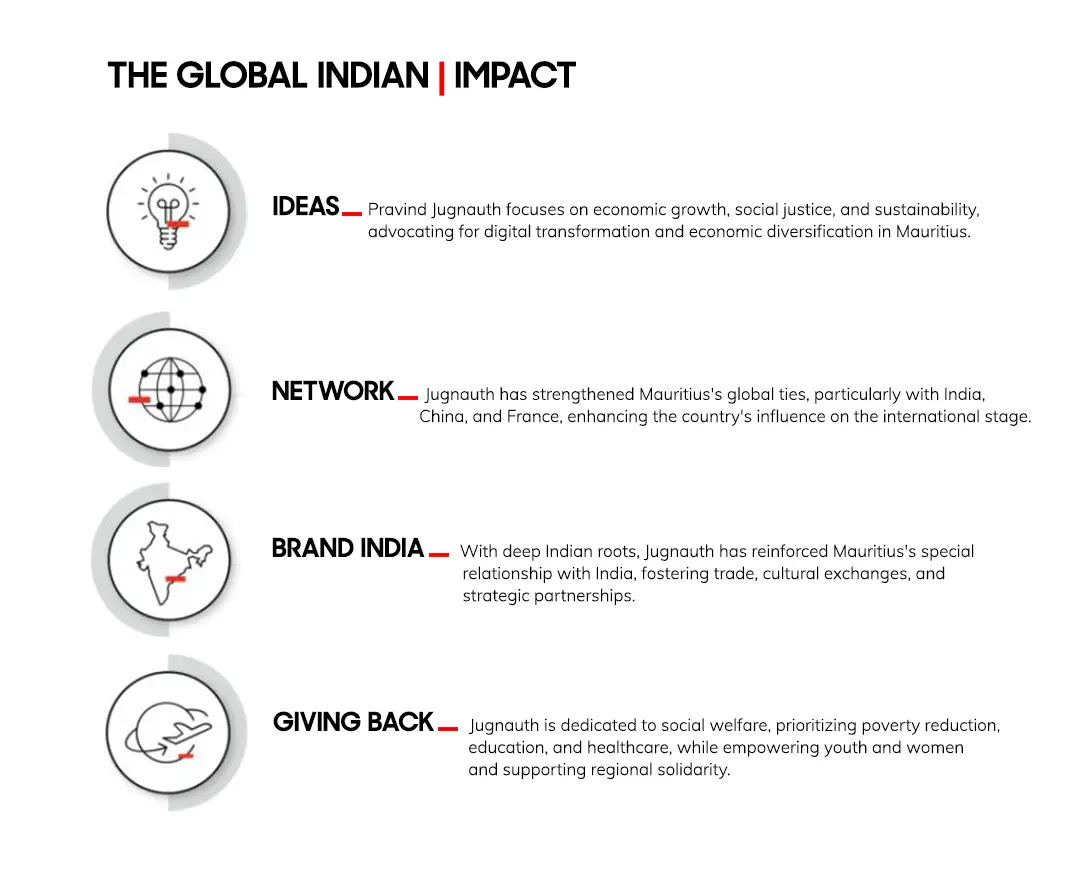
Also Read: Journey of Pramila Jayapal
FAQs
Who is Pravind Kumar Jugnauth?
Pravind Kumar Jugnauth is the current Prime Minister of Mauritius, having assumed office in January 2017. He succeeded his father, Sir Anerood Jugnauth, who previously held the position. Pravind is a prominent figure in Mauritian politics, leading the Militant Socialist Movement (MSM) party. His family has long been influential in the political landscape of Mauritius. He has held various ministerial roles, including Minister of Finance. Jugnauth has been instrumental in shaping modern Mauritius through economic reforms and social initiatives, continuing the legacy of his family, which has significantly shaped the nation’s political history.
What is Pravind Kumar Jugnauth’s nationality?
Pravind Kumar Jugnauth is a Mauritian by nationality. Mauritius is a multi-ethnic and multi-cultural island nation located in the Indian Ocean. Jugnauth, like many Mauritians, has ancestral roots tracing back to India, as his forebears arrived from India during British colonial rule as indentured laborers. Though Mauritius gained independence in 1968, its citizens retain a deep sense of national identity, with Jugnauth embodying this through his leadership roles. Despite the influence of multiple cultures, Jugnauth’s political philosophy is centered around national development, inclusiveness, and preserving Mauritius’s unique multicultural heritage as a symbol of national unity.
What is Pravind Kumar Jugnauth’s net worth?
Pravind Kumar Jugnauth’s net worth has not been publicly disclosed in precise terms, but as Prime Minister and a long-serving politician, he is presumed to have accumulated considerable wealth. His income sources include his salary as Prime Minister, his previous ministerial roles, and other investments. However, as a public figure, any financial holdings or assets would be subject to scrutiny in line with the governance standards of Mauritius. Jugnauth’s wealth is often viewed within the context of his powerful political family, which has long been associated with wealth, influence, and business interests in the country.
What is Pravind Kumar Jugnauth’s connection with India?
Pravind Kumar Jugnauth has a deep connection with India, both personally and politically. His ancestral roots lie in India, as his forefathers were indentured laborers brought to Mauritius during British rule. Today, he maintains strong diplomatic and economic ties with India. Under his leadership, Mauritius has strengthened cooperation with India in areas like infrastructure development, investment, and maritime security. India has been a crucial partner in various Mauritian projects, including the Metro Express and other developmental initiatives. Jugnauth also acknowledges the cultural bond between the two nations, frequently participating in India-Mauritius joint ventures and cultural exchanges.
What has Pravind Kumar Jugnauth contributed to Mauritius?
As Prime Minister, Pravind Kumar Jugnauth has played a pivotal role in advancing Mauritius’s economic development and social policies. He introduced reforms in sectors like education, healthcare, and infrastructure. Notably, Jugnauth spearheaded the implementation of the Metro Express project, which revolutionized public transport in Mauritius. He has also prioritized expanding digital infrastructure and promoting Mauritius as a financial hub. His government focused on improving social welfare, including pensions and housing. Furthermore, Jugnauth’s leadership during the COVID-19 pandemic was instrumental in protecting public health and stabilizing the economy. His vision for Mauritius emphasizes sustainability and innovation.
Who is Pravind Kumar Jugnauth’s spouse?
Pravind Kumar Jugnauth is married to Kobita Ramdanee-Jugnauth. The couple has been together for many years and shares a strong bond. Kobita is known for her active role in social causes and charity work, particularly focusing on women’s empowerment and children’s welfare. She has maintained a relatively low profile in terms of public political involvement but is a supportive figure in her husband’s political career. As the spouse of the Prime Minister, Kobita often participates in official state functions and contributes to various community programs, reflecting her commitment to societal progress and philanthropy in Mauritius.



